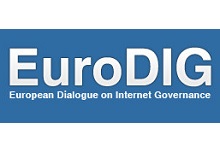Ethics by design: Moving from ethical principles to practical solutions
20 Jun 2019 11:00h - 12:30h
Event report
[Read more session reports and live updates from the EuroDig 2019]
The moderator, Ms Aimee van Wynsberghe (Assistant Professor in Ethics and Technology, Delft University of Technology), remarked that currently there are about 44 different sets of ethical principles and guidelines published, and that the next step is implementing and transferring them into practical technical solutions.
From a regulatory perspective Mr Andreas Hauptmann (Director for EU and International, incl. Data Ethics and Artificial Intelligence, Danish Business Authority (DBA)) said that Denmark started the ethics debate in 2017. An expert group was formed to produce recommendations to the government. Trust is crucial for the uptake of all new technologies in our societies. Also, we need a new business model. The new model should not be a barrier for innovation and competitiveness, but should allow data ethics and businesses to co-exist.
According to Hauptmann, autonomy, explainability, dignity, equality and fairness, responsibility, and innovation are the basic values (rather than principles) to keep in mind when talking about ethical data management. Hauptmann noted that explainability includes both being able to explain algorithmic decisions and the process of creating the ethics guidelines to the consumer. ‘Ethics are contextual, because they represent different things for different companies and environments’, he stressed. He recommended striving towards making data ethics a competitive parameter on the market, where a good first step would be an international seal based on which companies and products are data ethical.
Engaging with the multistakeholder model, the Danish government has been working on practical solutions such as data ethics certificates and seals and obligatory disclosure for companies on their internal data ethics policy and in their corporate social responsibility policy.
Ms Elettra Ronchi (Senior Policy Analyst, Organisation for Economic Co-operation and Development (OECD)) reminded the audience of the long-term engagement of the OECD with developing privacy guidelines in the 1980s. The OECD is now reviewing them with respect to new and emerging technologies and concerns. ‘There is a change of scale in terms of both opportunities and risks’, Ronchi said. Trust, people-centric solutions, and addressing power relations around data ownership are key for being more ethical. The OECD focused on five value-based principles aimed at promoting the sustainable development goals (SDGs), inclusive growth, transparency, explainability, and accountability. If something is lawful, that does not necessarily mean that it should be done and people have to understand this. To this end, the OECD is developing a data taxonomy so that everyone understands the terms. Additionally, the OECD is planning to launch an artificial intelligence (AI) observatory with best practice cases from its member states.
Ms Meeri Haataja (CEO, Saidot.ai) agreed that it is important for all stakeholders to understand the terms, what ethics is and how existing solutions can help build ethical technological tools. However, Haataja stressed that all of the terms used are often misunderstood. For example, transparency has to be understood by all stakeholders, yet they all see it differently. Therefore, we have to have different levels of transparency for different audiences, from users to developers to managers. The main concern today is ensuring interoperability and the similarity of our interpretation of terms. Only if everyone agrees on what transparency is, it can provide the value that we are seeking. She said that the value of transparency could also be a good perspective for regulation as the EU General Data Protection Regulation already builds on it. There are quite a few tools out there but it is also important to understand that they have to be very industry- and context-specific.
The audience raised several questions about potential ‘ethics washing’ practices in Europe, the definitions of ‘fairness’, ‘bias’, and what the red lines should be when implementing AI solutions. A question was also raised on the importance of developing a global understanding on what ‘ethics’ and ‘ethical’ mean, especially as factors such as geopolitics and a lack of an international framework play an important role in the development of global cyber conflicts. The need to include more technical perspectives (from technology builders and developers) in the ethics discussions was brought up.
By Jana Misic
Related topics
Related event

